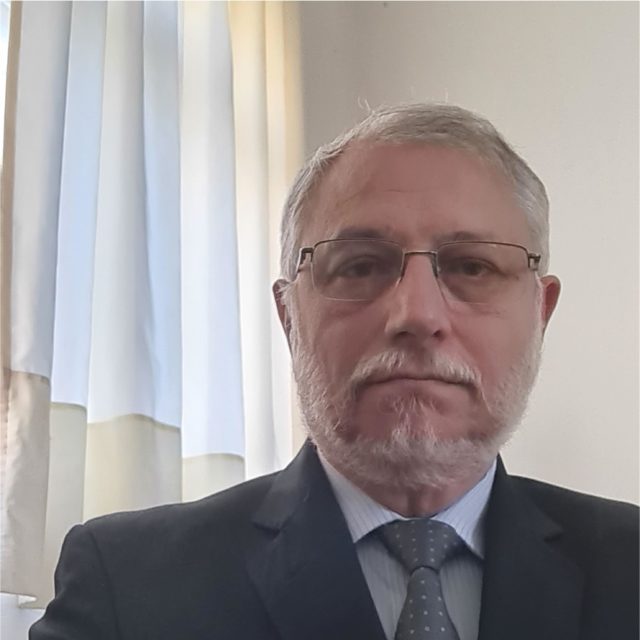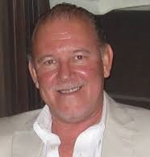SIGNAL PROCESSING
TECHNICAL PROGRAM COMMITTEE
Chair

Ing. Pedro M. Giuffrida
Pedro M. Giuffrida graduated as an Electronics Engineer from the National Technological University, Buenos Aires Regional Faculty (UTN.BA), Specialist in Information Systems Engineering, and completed a Master’s Degree in Information Systems Engineering.
He completed Postgraduate studies in different subjects such as Comprehensive Quality Management, Business Administration, Digital Economy, and Internet Marketing.
He was Professor at the UTN.BA of the Chairs of Propagation and Electromagnetic Radiation, Digital Techniques I and II between the years 1984 to 1987.
At the Technological Institute of Buenos Aires, he served as Professor of Fixed Mobile Convergence and Internet of Things in the Master’s Degree in Telecommunications between 2005 and 2010.
He served as Professor of the Chair of Digital Signal Processing and Analysis of Signals and Systems at the University of Palermo from 2014 to 2017.
He was Jury of Master’s Thesis and Degree in the I.T.B.A. and the UNdAv as well as Tutor of degree thesis related to Telecommunications.
He held different executive positions in Telecommunications Companies since my graduation; Director of Operations at TELECENTRO S.A. from 2013 to 2021, Technology Works Manager at MOVISTAR S.A. From 2007 to 2012, Operations and Maintenance Manager at MINIPHONE S.A. from 1999 to 2007, Quality Management Manager at MINIPHONE S.A. from 1995 to 1999, and subdirector of Engineering at ERICSSON S.A. from 1989 to 1995.
He is a Senior Counselor for the Graduate Senate at UTN.BA.
He served as Alternate Director in the Professional Council of Telecommunications, Electronics and Computing Engineering (COPITEC) where, in addition, he chaired the Artificial Intelligence and Robotics Commission and participated in the Satellite Affairs Commission and the New ICT Technologies Commission.
He is Vice President of the Foundation for the development of Telecommunications, Electronics, and Computing (FUNDETEC).
He is currently Coordinator – Vice Dean at the National University of Moreno of the Electronics Engineering Career and Professor of the Chairs of Antennas and Propagation, Communications System III, and Assistant of Communications System I.
He directs the Telecommunications Research Group (GRITE) focused on the study of high-capacity modulation techniques and electronic tracking antennas (beam steering) and the SIMAB project focused on the development of biometric monitoring and alert systems.
He participates in the development of the LORAWAN network for obtaining data through sensors (IoT).
DISTINGUISHED SPEAKERS

PhD. Ricardo Armentano FeijooRicardo L. Armentano has an outstanding trajectory in the cardiovascular engineering field–both in the theoretical principles and in the application to clinics – justified through his two Ph.D one in Physiological Sciences at the University of Buenos Aires (1994) and the other one in Physics Sciences (Biomechanics) at the University of Paris (1999) as well as his two post Ph.D studies, one in the Department of Physiology of the College of Medicine at the University of the Republic of Uruguay with the Professor Ph.D Ricardo Vellutti as scholar of the Fondo Clemente Estable CONICYT in the Quantitative Physiology area (2002-2003) and the other through a scholarship (bourse senior the La Ville de Paris) to develop Predictive Models of Cardiovascular Risk under the direction of professor Ph.D Alain Simon at the Hôpital Européen Georges Pompidou and the University of Paris V Descartes (2008-2009). His areas of specialization are Biomechanics and Vascular Hemodynamics (Laboratoire de Biorhéologie et d’Hydrodynamique Physico Chimique, CNRS, Université Denis Diderot. Paris VII. France) and Data Science, Signal Processing and Biological Systems Modeling INSERM Unité de Recherches Biomathématiques et Bioestatistiques, Université Denis Diderot. Paris VII. France) in this theme he was personal adviser of Ph.D Rene Favaloro (1992-1999). He created a new line of thought in the biomedical engineering which has consolidated him as leader in the field in Latin America. He devoted to model cardiovascular hemodynamics in healthy subjects and in many types of cardio metabolic illnesses. The technological developments derived from his Ph.D thesis works have given place to prestigious methods of cardiovascular diagnosis which are used in centers of vascular exploration in Latin America as well as at the European Hospital George Pompidou, Paris where he carried out his second post Ph.D studies. |
DESCRIPTION
Signal processing is a technology that allows generation, transformation and interpretation of information.
| SUBTEMAS SUGERIDOS |
| For this topic, the following subtopics are suggested. Please note that you may send your paper beyond the scope of this list. In such a case, you must specify, in submission web form, the new subtopic that you consider your paper belongs to, as per instructions in Tutorial for Paper Submissions. |
- Analog/ Digital Signal Processing
- Communication Systems and Networks
- Data Science
- Hearing Assistance and Improvement
- Image Processing and Analysis
- Self-driving vehicles
- Visual Signal Processing
- Voice Recognition
- Voice and Audio Processing
ACCEPTED ARTICLES
ID |
Title |
Author |
| 1721 | Diseño, Implementación y Validación de un Simulador de Señal L1 de GPS en MATLAB | Lucas Sanz, Lautaro Lorenzen, Ignacio López García and Ernesto Mauro López |
| 5101 | Space-Frequency Orthonormal Compensation Method for GNSS Compact Antenna Array Designs | Ezequiel Alejandro Marranghelli, Ramón López La Valle and Pedro Agustín Roncagliolo |
| 5496 | Global Temperature Anomaly by Volterra-Laguerre Model from CO2 Emission, Solar Irradiance, Population, and the Oceans Heat Content | Carlos Medina-Ramos, Daniel Carbonel-Olazabal, Judith Betetta-Gómez and Irene Tafur-Anzualdo |
| 5721 | Medición de Señales WLAN/RLAN que Interfieren a los Radares Meteorológicos Argentinos | Gabriel Walter Ezequiel Giovanardi, Juan Pablo Pascual and Jorge Cogo |
| 6868 | Information Theory and Multi-site Harmonization of rs-fMRI | Facundo Roffet, Claudio Delrieux and Gustavo Patow |
| 7991 | Easy5G: Software for Simulation and Study of 5G NR Interface | Jean Fonseca, Amanda Fernandes and Fernanda Corrêa |
| 8660 | Degradación de los observables de radar meteorológico debido a la Interferencia Wi-Fi | Emilia Correa, Jorge Cogo and Juan Pablo Pascual |
| 8950 | Análisis del efecto de la interferencia WiFi sobre la velocidad Doppler en radar meteorológico | David Benoit, Jorge Cogo and Juan Pablo Pascual |
| 9767 | Digitalization of a Radar’s IF Signal Receptor | Tomas Sarquis, Santiago A. Rodriguez and Mauro G. Gómez |
